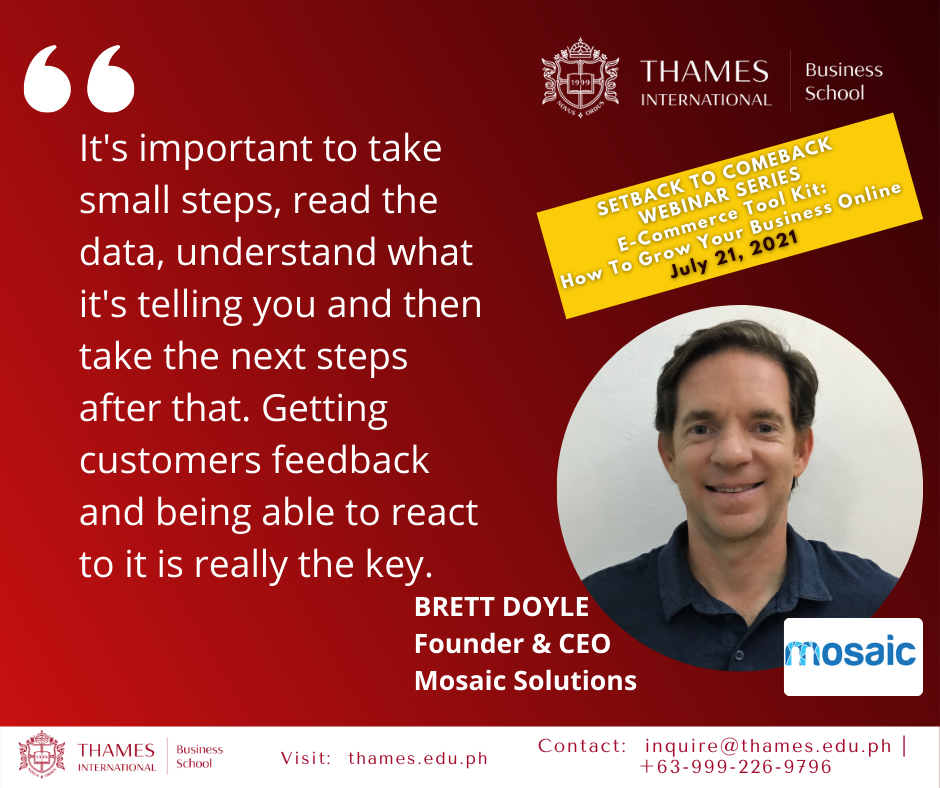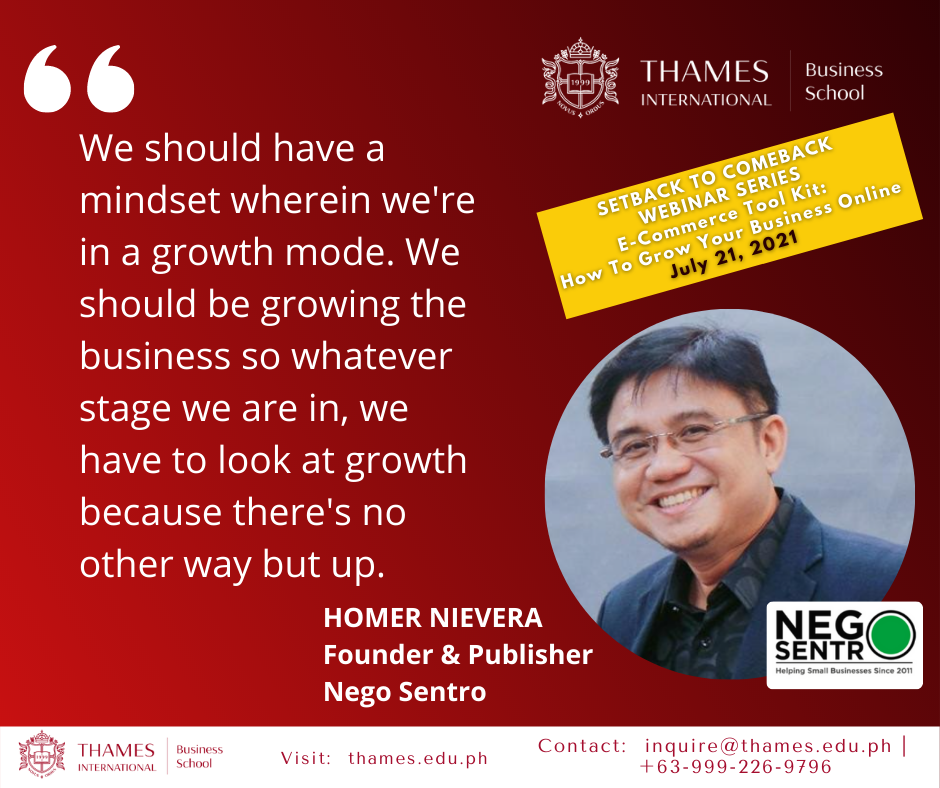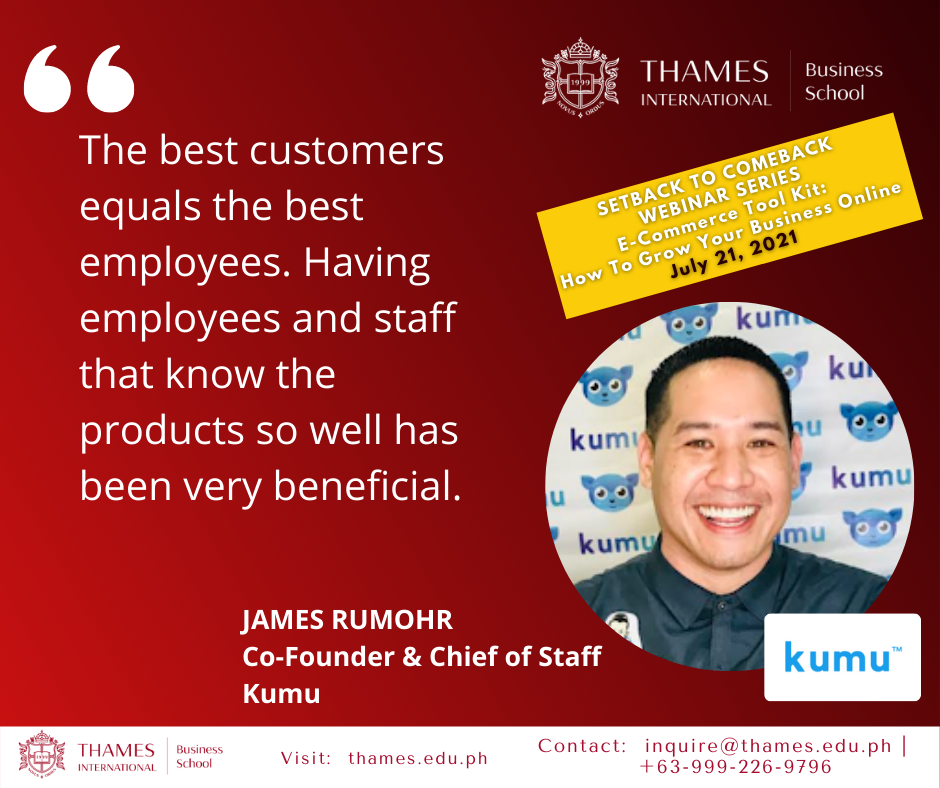E-Commerce Tool Kit: How To Grow Your Business Online
by Ivan Andrew C. Combalicer, Thames International Undergraduate Student

The COVID-19 pandemic has challenged the survival of businesses all over the world. After being in quarantine for over a year, it is important to think not just of ways for your business to survive, but also strategies to make it thrive. Last July 21, 2021, Thames International conducted the third episode of the “Setback to Comeback” webinar series entitled, “E-Commerce Tool Kit: How To Grow Your Business Online”. The panelists for this episode are Brett Doyle, Founder & CEO of Mosaic Solutions; Homer Nievera, Founder & Publisher of Nego Sentro; James Rumohr, Co-founder and Chief of Staff of Kumu; and Javier Villaruel, Owner of Bayongciaga. The four entrepreneurs shared the challenges and successes their organizations faced during the pandemic.
According to Doyle, when the pandemic started, he and his team were contemplating whether to bunker down and just hope for the best or go out and be helpful to the community and to their clients. They all agreed to pick the latter. They began by starting an initiative where they provided food for people in need. They helped their clients in the food industry to earn revenue by paying them with the funds raised from the initiative. The pandemic allowed them to onboard more clients compared to the past three years through the determination of his team to constantly improve their technology. He shared that “It’s important to take small steps, read the data, understand what it’s telling you and then take the next steps after that. Getting customers feedback and being able to react to it is really the key.”

Just like Doyle, Nievera found the pandemic to be a great opportunity to help the community while earning money at the same time. He reminded everyone to learn fast and fail fast since according to him, “Everything right now is a learning process… you have to have your own framework now.” He added, “We should have a mindset wherein we’re in a growth mode. We should be growing the business so whatever stage we are in, we have to look at growth because there’s no other way but up.”

Rumohr said that Kumu benefited from people staying at home. From four to five million users before the pandemic, they now have 11 million. Their team also grew from 75 to 350 regular employees. They were determined to build a community where users could join and keep using the app. They made sure to improve their features and updates to keep up with the number of users. He said “The best customers equals the best employees. Having employees and staff that know the products so well has been very beneficial.”

“If we want to thrive, we have to make sure to be ready for what lies ahead,” said Villaruel. His business had a hard time coping with the pandemic as the demand for bags decreased. They also struggled with logistics due to the lockdown and the fact that the products come from different points in the Philippines. He also said that he had to sacrifice his own salary and cut the salaries of his employees instead of letting them go. They created new products for plant lovers and offered gifting services for different occasions like Mother’s Day, Father’s day, Christmas, etc. He reminded everyone that “Bouncing back is always possible if you have the heart and passion for what you do.” Then he also added, “In this day and age, the market is also digital and it’s so easy to build a brand and it’s also easy to destroy it simply because you didn’t prepare well for it.”

Joel Santos, the President of Thames International and the moderator of the webinar, shared the three permanent behavior changes brought by the pandemic; online shopping, online learning, and work from home. He asked the panelists about the impact of the three behavior changes on business from an e-commerce perspective. Doyle said that being able to pay electronically provides comfort for consumers and can be one of the greatest drivers of consumer behavior. The rest of the panelists said that as business owners, this is the opportunity to look out for their staff. They all come up with ways to lessen the online fatigue and stress brought by the pandemic by organizing different virtual activities such as Friday nights out, virtual happy hours, virtual town hall meetings, etc.
When asked about their outlook for 2022, Nievera said that his company will be busy especially come election season. He advised small businesses to create their own niche especially since there are many competitors in the digital world. Rumohr said that he will optimize their staff by utilizing their strengths and recognizing their weaknesses. Villaruel is busy preparing for Christmas. He is also looking forward to doing on-ground events next year. He said that he has to remain hopeful and positive for those who rely on his business. He added that the business leaders have to lead the way for the bounce back from the pandemic.
Overall, the webinar received positive feedback from the participants. The panelists were well appreciated. One participant mentioned that they like how the positivity of Thames and the speakers gave them the courage to continue their business.
Having the right team and looking out for them in these difficult times is a great strategy for your business to thrive. Adapting your business with today’s situation won’t be easy, and Thames International is dedicated to providing guidance for businesses to not just survive but thrive.
Thames International is committed to building a new order for the world by giving talented students and entrepreneurs the tools to thrive and lead the way in a world beset by rapid change. If you’re interested in augmenting your skills and making connections with some of the brightest minds in business education today, please take a look at our future-proof undergraduate and postgraduate programs.

